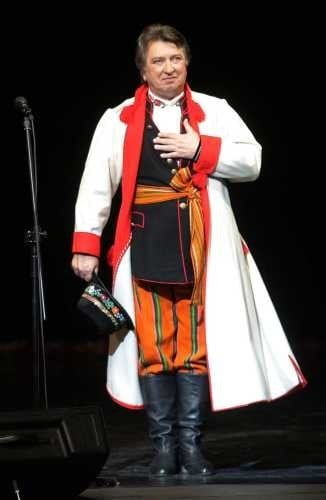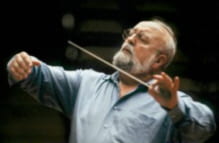Polish Music Center Newsletter Vol. 12, no. 9
PMC News
First Hearing
When thinking of Polish music, a few names inevitably come to mind. Chopin, Moniuszko, maybe even Szymanowski. In contemporary music it’s Penderecki, Lutosławski, and Górecki. And the concerts where Polish music is featured pretty much reflect this regrettably short list.
Of course there are many more Polish composers. The history of Polish music began in the Middle Ages, with several great musicians who were active in the ancient Polish capital of Kraków. This strong and long-standing tradition happily continues to our times, with Polish contemporary music being represented by many different composers and a great variety of styles.
Part of the Polish Music Center’s mission is to bring some lesser-known names into the spotlight. Our recent publication, Maria Szymanowska—Pianist and Composer (PMHS Vol. 9), spotlights an extraordinary woman. A divorced mother of three, Szymanowska (1789-1831) was a great virtuoso and an original composer whose works—Polonaises, Preludes, Etudes, and Mazurkas—certainly gave Chopin a head start. A friend of Pushkin and Goethe and mother-in-law of Mickiewicz, Szymanowska was a court pianist for the Russian Imperial Family. She also toured the world, garnering universal acclaim. The book’s author, Sławomir Dobrzański, not only researched Szymanowska’s life, but also recorded some of her music on a CD that is included with the book.
Another way the Polish Music Center tries to broaden the musical horizons of the general public is through the various concerts we organize—on the USC Campus, around Los Angeles, and elsewhere in California. Occasionally our programs reach across the continent to the East Coast and even overseas, with Brazil and Poland being but two of our recent musical adventures. These concerts often feature lesser-known composers whose music is undeservedly forgotten. Some of the musicians we present were very famous in their day, some died before the world had a chance to hear their music, and others just receded into history.
Programming unknown music can be a challenge. Sometimes finding the score and instrumental parts can be daunting. Rehearsals can also take much longer, since these works are not in the repertoire, and most musicians must first learn and discover how this music sounds. This process, quite obviously, does take time. For the public though, the first performance of anything should be an exciting event, awaited eagerly with much anticipation. Alas, a chance to hear something for the first time is often seen as an occasion to avoid. The unfamiliar repertoire could be a challenge, but is it?
 Last March, the Polish Music Center in cooperation with the Park La Brea events featured the Midnight Quintet at a concert for the local community of residents. The choice of music for this group of USC students included—among other works—the Quintet for Winds by Tadeusz Szeligowski. This performance was certainly an American premiere, and the audience was not necessarily composed of the usual group of devoted concert-goers. Yet, this unfamiliar work received a tumultuous applause, earning the Midnight Quintet an invitation to return to Park La Brea later this year. Aside from the fact that not many Poles can recognize the name of Tadeusz Szeligowski (1896-1963), he is a completely unknown composer to an American audience. Yet Szeligowski was a fairly popular neo-classical composer who wrote numerous chamber works, concertos, and operas. In fact, when Szeligowski’s distant cousin in Poland was telephoned on the day of the concert and told about the performance in Los Angeles, California, he was overcome with emotion and gratitude for bringing back his relative’s name to the concert stage.
Last March, the Polish Music Center in cooperation with the Park La Brea events featured the Midnight Quintet at a concert for the local community of residents. The choice of music for this group of USC students included—among other works—the Quintet for Winds by Tadeusz Szeligowski. This performance was certainly an American premiere, and the audience was not necessarily composed of the usual group of devoted concert-goers. Yet, this unfamiliar work received a tumultuous applause, earning the Midnight Quintet an invitation to return to Park La Brea later this year. Aside from the fact that not many Poles can recognize the name of Tadeusz Szeligowski (1896-1963), he is a completely unknown composer to an American audience. Yet Szeligowski was a fairly popular neo-classical composer who wrote numerous chamber works, concertos, and operas. In fact, when Szeligowski’s distant cousin in Poland was telephoned on the day of the concert and told about the performance in Los Angeles, California, he was overcome with emotion and gratitude for bringing back his relative’s name to the concert stage.
 This September we’ll once again present a few more interesting premieres. On the September 7th concert at United University Church on the USC campus, two string works by Zygmunt Stojowski will open the program. Zygmunt Stojowski (1870-1946, pictured at right) was a great virtuoso pianist and composer, who lived in the United States since 1905. His manuscripts and personal papers were recently donated to the Polish Music Center. We have transcribed and edited Stojowski’s music, printing parts for each player and producing scores for the conductor. The music that until now existed only in composer’s mind and was carefully notated on century-old staff paper will get its first hearing at that concert. The September 7th concert will also feature the Concertino for Oboe and Strings by Tadeusz Kassern (1904-1957). Although the orchestral parts for the composition were found in Poland, there was no sign of a conductor’s score. A lengthy search through numerous archives and libraries finally located it at the Free Library in Philadelphia. Once all the materials were assembled here, at the Polish Music Center, it turned out that the orchestral parts and the conductor’s score had never before been lent out for performance. There were no pencil markings on the music, indicating that the work hadn’t been rehearsed. The Free Library in Philadelphia confirmed that the conductor’s score was never before checked out. As a result of cooperating with the Polish Music Publishers [ZKP] (who provided the orchestral parts) and the Fleischer Collection Librarian in Philadelphia (who provided the conductor’s score), we will finally have the world premiere of Kassern’s charming, three-movement work, in performance by a USC student orchestra assembled just for this event.
This September we’ll once again present a few more interesting premieres. On the September 7th concert at United University Church on the USC campus, two string works by Zygmunt Stojowski will open the program. Zygmunt Stojowski (1870-1946, pictured at right) was a great virtuoso pianist and composer, who lived in the United States since 1905. His manuscripts and personal papers were recently donated to the Polish Music Center. We have transcribed and edited Stojowski’s music, printing parts for each player and producing scores for the conductor. The music that until now existed only in composer’s mind and was carefully notated on century-old staff paper will get its first hearing at that concert. The September 7th concert will also feature the Concertino for Oboe and Strings by Tadeusz Kassern (1904-1957). Although the orchestral parts for the composition were found in Poland, there was no sign of a conductor’s score. A lengthy search through numerous archives and libraries finally located it at the Free Library in Philadelphia. Once all the materials were assembled here, at the Polish Music Center, it turned out that the orchestral parts and the conductor’s score had never before been lent out for performance. There were no pencil markings on the music, indicating that the work hadn’t been rehearsed. The Free Library in Philadelphia confirmed that the conductor’s score was never before checked out. As a result of cooperating with the Polish Music Publishers [ZKP] (who provided the orchestral parts) and the Fleischer Collection Librarian in Philadelphia (who provided the conductor’s score), we will finally have the world premiere of Kassern’s charming, three-movement work, in performance by a USC student orchestra assembled just for this event.
 Those who did not have a chance to hear the Szeligowski Wind Quintet in March will have a chance to hear it again on September 13th. Other pieces on this program will include the Wind Quintet by Grażyna Bacewicz (1909-1969, pictured at left), another distinguished and prolific Polish composer, and a Fantasia Op. 1 for Organ by August Freyer (1803-1883), who was born in Dresden but spent most of his life in Poland. Freyer was not only a teacher of Elsner (and Elsner taught Chopin) but he also authored numerous books on music theory and singing that were used in Polish schools well into the 20 th Century. This exciting concert is a lunchtime presentation in the Music at Noon Series at the United University Church at USC.
Those who did not have a chance to hear the Szeligowski Wind Quintet in March will have a chance to hear it again on September 13th. Other pieces on this program will include the Wind Quintet by Grażyna Bacewicz (1909-1969, pictured at left), another distinguished and prolific Polish composer, and a Fantasia Op. 1 for Organ by August Freyer (1803-1883), who was born in Dresden but spent most of his life in Poland. Freyer was not only a teacher of Elsner (and Elsner taught Chopin) but he also authored numerous books on music theory and singing that were used in Polish schools well into the 20 th Century. This exciting concert is a lunchtime presentation in the Music at Noon Series at the United University Church at USC.
The Polish Music Center’s concerts are always listed on the internet (see www.usc.edu/music/PMC) and advertised by mail to our ever growing mailing list (let us know if you would like to be a part of that list at polmusic@usc.edu). Please consider lending an open ear to our musical offerings this Fall. Hearing anything first is a rare opportunity indeed, and it shouldn’t be missed. We’re looking forward to seeing you at as many of our concerts as you are ready to attend!
[MZ]
News
Changes In National Theatre – Grand Opera
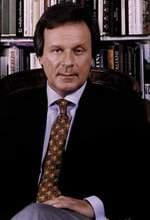 On August 4, 2006 Kazimierz Michał Ujazdowski, Polish minister of culture, officially accepted the resignation of Kazimierz Kord from the post of general and musical director of the National Theatre – Grand Opera. At the same time he nominated Janusz Pietkiewicz (pictured left) as the general director of the institution.
On August 4, 2006 Kazimierz Michał Ujazdowski, Polish minister of culture, officially accepted the resignation of Kazimierz Kord from the post of general and musical director of the National Theatre – Grand Opera. At the same time he nominated Janusz Pietkiewicz (pictured left) as the general director of the institution.
Kazimierz Kord, in the official statement, explained that his decision came as the only reasonable action after the employees of the Opera poorly rated the leadership of all the directors. Even though Kord overall has received the highest number of positive votes (336 positive vs. 400 negative votes), he still decided to step down as a director of the National Theatre – Grand Opera. The other management personnel, including artistic director, Mariusz Treliński, has received under 100 positive votes. These results, according to Kord, were unacceptable and the only resolution he saw was to resign. Kazimierz Kord said that any other reasons for his resignation, speculated upon in the press, are untrue.
The nomination of Janusz Pietkiewicz is a fairly controversial one. Born in 1946, he worked for Pagart (Polish Concert Agency), Poltel (Polish TV Film Agency), and during 70s and 80s he occupied different managerial positions in the Polish Television and Radio. He has already served as the general director of the National Theater (1996-1998), but his efforts to combine the dramatic and operatic aspects of the institution failed and as a result he was dismissed from the position. Most recently, Pietkiewicz was the director of the Theater and Music Bureau of the city of Warsaw.
Janusz Pietkiewicz has announced that for the coming season there will be five continuing spectacles: La Bohéme, Pique Dame, Don Giovanni, King Roger, and Madame Butterfly.There will be a premiere of Magic Flute by Achim Freyer and Wozzeck by Krzysztof Warlikowski, also a Ballet Evening prepared by Jiři Kylian and chamber spectacles prepared as part of the “Territories” cycle. The fate of the Szymanowski ballet show and world premiere of Paweł Szymański’s opera are still unknown since there has been very little progress made towards getting the projects stage ready recently.
According to Ludwik Erhardt, editor-in-chief of Ruch Muzyczny, “Pietkiewicz is a bad candidate, he has failed on many occasions…” This nomination was made with hope of healing the atmosphere of conflict in what is one of the most important artistic institutions in Poland, but it is yet to be seen whether the desired healing comes to pass or conflicts only become more deeply entrenched as a result of the decision.
Krauze Opera Premiere
 The world premiere of Zygmunt Krauze’s new opera Bal w operze [A Ball in the Opera] will take place on September 10th in Łódź, during the 5th edition of the Dialogue of Four Cultures Festival. Łódź is a city that is influenced very strongly by the Polish, Jewish, Russian and German cultures, and this festival reflects the harmony in which they coexist. Bal w operze is based on a text by Julian Tuwim. The performers for the world premiere are the Schol Cantorum Gedanensis choir and the Łódź Philharmonic. The performance will be directed by Tomasz Konina and will take place in the Teatr Jaracza.
The world premiere of Zygmunt Krauze’s new opera Bal w operze [A Ball in the Opera] will take place on September 10th in Łódź, during the 5th edition of the Dialogue of Four Cultures Festival. Łódź is a city that is influenced very strongly by the Polish, Jewish, Russian and German cultures, and this festival reflects the harmony in which they coexist. Bal w operze is based on a text by Julian Tuwim. The performers for the world premiere are the Schol Cantorum Gedanensis choir and the Łódź Philharmonic. The performance will be directed by Tomasz Konina and will take place in the Teatr Jaracza.
Penderecki Premiere In Giverny
Krzysztof Penderecki will be an honorary guest at the Chamber Music Festival in Giverny, France. This year’s edition focuses on the music of Robert Schumann and Krzysztof Penderecki and includes a world premiere of his new work, Divertimento for cello solo.The work will be performed by French cellist, Michel Strauss.
Waters’ Mega Production
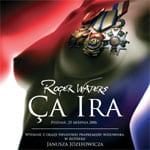 The world premiere of the opera Ça Ira, created by international star Roger Waters (formerly of Pink Floyd), took place on August 25, 2006, in Poznań, during the International Poznań Fair. Ça Ira combines the genres musical, opera, circus, gospel and rock music. The main theme, the French Revolution, serves as a pretext to contemplate freedom and its consequences, perils and benefits.
The world premiere of the opera Ça Ira, created by international star Roger Waters (formerly of Pink Floyd), took place on August 25, 2006, in Poznań, during the International Poznań Fair. Ça Ira combines the genres musical, opera, circus, gospel and rock music. The main theme, the French Revolution, serves as a pretext to contemplate freedom and its consequences, perils and benefits.
On the visual level, the show was presented as a multi-layered outdoor show. The opera convention was intertwined with the domains of circus and acrobatics. The language of the opera and circus sounded in unison with that of movies (3D sequences shown on large screens imitate parts of the real world) and massive scale spectacle (marching troops, battle scenes, cavalry, carriages, armored vehicles). Special lighting effects gave the show a unique character and splendor. And instead of constructing some parts of the set design, the creators of the masterpiece painted them with illumination on buildings and in the sky up to 3 kilometers above the audience’s heads.
Although the open air extravaganza was a one of a kind project, the stage premiere of the opera will take place in the Moniuszko Grand Theater on November 11, 2006.
For more information on the show, tickets and performers you can visit the official website of the production.
Penderecki Center’s New Hall
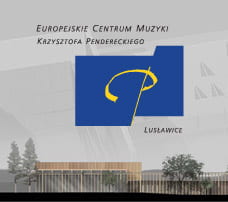 Krzysztof Penderecki’s European Music Center was founded in 2005 and is based in Lusławice. The goal of the institution is to educate and gather the most talented young musicians, educators and professors to allow the young generation to deepen their musical knowledge. At the end of August, Polish vice-minister of culture Jarosław Sellin and Krzysztof Penderecki placed the foundation stone for the new concert hall to be used by the European Music Center.
Krzysztof Penderecki’s European Music Center was founded in 2005 and is based in Lusławice. The goal of the institution is to educate and gather the most talented young musicians, educators and professors to allow the young generation to deepen their musical knowledge. At the end of August, Polish vice-minister of culture Jarosław Sellin and Krzysztof Penderecki placed the foundation stone for the new concert hall to be used by the European Music Center.
Chopiniana In Argentina
At the Teatro Avenida in Buenos Aires, between September 8 and October 24, Argentinians are celebrating the legacy of Chopin. The Fundacion Chopiniana has invited an impressive list of performers for the festival. Events include recitals by Philippe Giusiano (France), Matthias Soucek (Austria), Martin Kasik (Czech Republic) Martha Noguera (Argentine), Krzysztof Jabłoński (Poland), Adam Wodnicki (USA), Francesco Nicolosi (Italy), Vittorio Bresciani (Italy).
For concert times and venues, visit: www.infochopin.pl.
Top 10 Chopin Performers
In the September 2006 issue of Gramophone magazine, music critic Bryce Morrison gives an illuminating and witty list of who he considers to be the Top 10 Chopin performers of all time…
- Arthur Rubinstein, who saved Chopin from “performances…tainted by excess…[and] found in him a new strength and virility…Above all, he paid tribute to a central paradox, to a vocally inspired composer who wrote almost exclusively for the piano”
- Alfred Cortot, who was a “more idiosyncratic pianist than Rubinstein…[but] to which one returns with endlessly renewed illumination and delight”
- Vladimir Horowitz had “a dynamism, sophistication and wizardry that continues to pin listeners back by the ears”
- The “poker-faced” Benno Moiseiwitsch
- The “anti-thesis,” Dinu Lipatti, who “sought…purity and transperancy” in his performance
- Emil Gilels, whose “early incandescence modulat[ed]…into a rich, full-toned mastery worth its weight in gold”
- Contemporary Murizio Pollini, who “showed heroic strength and lucidity”
- And Martha Argerich, who “returned us to a Chopin of such brilliance and volatility that the parameters of conventions seemed blown apart”
- Krystian Zimerman, who revisits these parameters, “ever seeking to define the borderline, between freedom and distortion, clarity and obscurity”
- Murray Perahia, who has “rare poise and articulacy”
PIAF Ballet At Baltic Opera
The new ballet entitled Edith, choreographed to the songs of and based on the life of Edith Piaf, will have its world premiere on September 29, 2006 on the stage of the State Baltic Opera in Gdańsk. Choreography is by Sławomir Gidel, decorations and costumes by Hanna Szymczak and the music was arranged by Tomasz Rogoziński. The ballet is not a direct biography of Piaf’s life but rather paints the picture of an emotional woman for whom music provided liberation from the monotony of existence. For more information, please visit the official web site of Baltic Opera.
Awards
French Medal For Semkow
 Polish conductor Jerzy Semkow (b. 1928, pictured at right) has been awarded the Commander’s Medal of Arts and Letters by the French ministry of Culture. This is the highest award given by the French government for achievements in the arts. The medal is also given in two lower ranks and other Polish artists who have been honored include Roman Polański, Tadeusz Kantor, Andrzej Żuławski and Magdalena Abakanowicz.
Polish conductor Jerzy Semkow (b. 1928, pictured at right) has been awarded the Commander’s Medal of Arts and Letters by the French ministry of Culture. This is the highest award given by the French government for achievements in the arts. The medal is also given in two lower ranks and other Polish artists who have been honored include Roman Polański, Tadeusz Kantor, Andrzej Żuławski and Magdalena Abakanowicz.
Jerzy Semkow is one of the most celebrated Polish conductors. He has held conducting posts with St. Louis Symphony Orchestra, Rochester Philharmonic, Italian Radio and Television Orchestra RAI, Royal Opera in Copenhagen, Denmark and National Theater – Grand Opera in Warsaw (first conductor). Jerzy Semkow lives in Paris.
ZKP Honorary Awards
In addition to the regular annual Polish Composers’ Union [ZKP] awards, there are two more people recognized for their input into Polish cultural scene. The 2006 honorary awards were announced and the recipients are: Marek Chołoniewski, for his festival and concert initiatives in Poland and abroad as well as for his efforts in integrating and promoting Polish artists; and Jerzy Kapuściński, for support and promotion of Polish contemporary music on Polish Television. The awards ceremony will take place on September 30 in the offices of ZKP.
Gloria Artis For Drzewiecki
Polish minister of culture and national heritage, Kazimierz Michał Ujazdowski, has honored outstanding Polish choreographer, educator and dance reformer, Conrad Drzewiecki, with Gold Medal Gloria Artis. According to Ewa Wycichowska, the current director of the Polish Dance Theater in Poznań, “Without him [Drzewiecki], many people would not be interested in contemporary dance.” This year’s edition of the Biennale of Contemporary Dance was dedicated to Drzewiecki and his work. Also there was an exhibition of posters and photos of Drzewiecki’s work.
Duo Artus Awarded
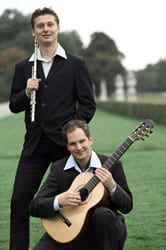 The Polish-German flute-guitar group Duo Artus, consisting of Krzysztof Kaczka (flute) and Perry Shack (guitar), have won the 2 nd place prize at the 2006 NFA Chamber Music Competition. The competition took place from 10-13 August 2006 in Pittsburg, PA. The first place was awarded to the Windfire Duo: Paula Kasica, flute and John Kasica, percussion. Third price went to “Ensemble Radieuse”: Christopher Vaneman, flute; Kelly McElrath, oboe; Melanie Foster Taylor, piano.
The Polish-German flute-guitar group Duo Artus, consisting of Krzysztof Kaczka (flute) and Perry Shack (guitar), have won the 2 nd place prize at the 2006 NFA Chamber Music Competition. The competition took place from 10-13 August 2006 in Pittsburg, PA. The first place was awarded to the Windfire Duo: Paula Kasica, flute and John Kasica, percussion. Third price went to “Ensemble Radieuse”: Christopher Vaneman, flute; Kelly McElrath, oboe; Melanie Foster Taylor, piano.
Festivals
Sinfonia Varsovia Festival
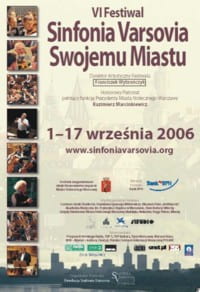 This annual festival, prepared by one of the best Polish orchestras, Sinfonia Varsovia, will take place between Spetmber 1 st and 17 th in venues around Warsaw. The festival is dedicated to the city with the honorary patronage of the president of the City of Warsaw, Kazimierz Marcinkiewicz. The goal behind the series of free concerts is to present the audience with works by the greatest composers, performed by the greatest artists, such as: Iwona Hossa, Adam Kruszewski, Jerzy Maksymiuk, Jacek Kaspszyk and Krzysztof Penderecki, among others. This year’s program includes works by: Vivaldi, Haydn, Mozart, Beethoven, Verdi, Bizet, Berlioz, Moniuszko and Wieniawski. You can find the complete concert calendar at www.polmic.pl.
This annual festival, prepared by one of the best Polish orchestras, Sinfonia Varsovia, will take place between Spetmber 1 st and 17 th in venues around Warsaw. The festival is dedicated to the city with the honorary patronage of the president of the City of Warsaw, Kazimierz Marcinkiewicz. The goal behind the series of free concerts is to present the audience with works by the greatest composers, performed by the greatest artists, such as: Iwona Hossa, Adam Kruszewski, Jerzy Maksymiuk, Jacek Kaspszyk and Krzysztof Penderecki, among others. This year’s program includes works by: Vivaldi, Haydn, Mozart, Beethoven, Verdi, Bizet, Berlioz, Moniuszko and Wieniawski. You can find the complete concert calendar at www.polmic.pl.
Starting in 2007, the festival will bare the name of Franciszek Wybrańczyk, the founder, long time director and manager of the orchestra, who just recently passed away.
Warsaw Autumn 2006
 The Warsaw Autumn festival was born in 1956 and is the only festival of international scope dedicated solely to contemporary music in Poland. The 49 th edition of the International Festival of Contemporary Music “Warsaw Autumn” will take place between September 22 and 30. There will be over 20 concerts, during which audiences will hear: 19 string quartets in one day (September 23, starting 12:00 PM until 11:00 PM, National Philharmonic); the operatic saga Kommander Kobayashi, consisting of operas by Aleksandra Gryka and Sergiey Newsky (September 27, National Theater); and Henryk Mikołaj Górecki’s monographical concert (September 29, St. Jack’s church), among others.
The Warsaw Autumn festival was born in 1956 and is the only festival of international scope dedicated solely to contemporary music in Poland. The 49 th edition of the International Festival of Contemporary Music “Warsaw Autumn” will take place between September 22 and 30. There will be over 20 concerts, during which audiences will hear: 19 string quartets in one day (September 23, starting 12:00 PM until 11:00 PM, National Philharmonic); the operatic saga Kommander Kobayashi, consisting of operas by Aleksandra Gryka and Sergiey Newsky (September 27, National Theater); and Henryk Mikołaj Górecki’s monographical concert (September 29, St. Jack’s church), among others.
Warsaw Autumn would not be complete without world premieres, this year there are 13 premieres planned. Composers who will have premieres include: Tadeusz Wielecki, Erik Oña, Zbigniew Bagiński, Zbigniew Penherski, Paweł Mykiety, Magdalena Długosz, Anna Zawadzka-Gołosz, Jarosław Siwiński, Jacek Kochan, Jerzy Kornowicz, Bogusław Schaeffer, Aleksander Szczetyński, Joanna Woźna and an opera by Zygmunt Krauze. There will also be many accompanying projects including two concerts of the “Youth Circle” of the ZKP (Polish Composer’s Union) and a concert of the Warsaw chapter of ZKP.
For more information about the festival, program, contact information and tickets please visit the official website of the festival.
Wratislavia Cantans Festival
 From the very beginning in 1966, the International “ Wratislavia Cantans” Festival of Oratorio and Cantata has been a festival without borders, presenting the music of many nations performed by some of the best international artists. This year will be no exception. Between September 9 and 17, the festival will enliven 24 cities of lower Śląsk [Silesia] and Opole regions and will also reach abroad, to Hejnice in the Czech Republic and Görlitz in Germany. Iinvited artists come from 11 different countries, including: Argentine, Croatia, Czech Republic, Estonia, France, Germany, Poland, Switzerland, USA, Great Britain and Italy. Audiences will hear early, baroque, classical and romantic in juxtaposition with contemporary compositions. Works presented will span from large vocal instrumental works to concertos, symphonies songs and dances.
From the very beginning in 1966, the International “ Wratislavia Cantans” Festival of Oratorio and Cantata has been a festival without borders, presenting the music of many nations performed by some of the best international artists. This year will be no exception. Between September 9 and 17, the festival will enliven 24 cities of lower Śląsk [Silesia] and Opole regions and will also reach abroad, to Hejnice in the Czech Republic and Görlitz in Germany. Iinvited artists come from 11 different countries, including: Argentine, Croatia, Czech Republic, Estonia, France, Germany, Poland, Switzerland, USA, Great Britain and Italy. Audiences will hear early, baroque, classical and romantic in juxtaposition with contemporary compositions. Works presented will span from large vocal instrumental works to concertos, symphonies songs and dances.
Since 1978, Wratislavia Cantans has been the only Polish member of the prestigious European Festival Association (EFA) in Geneva and since 1997 Lidia Geringer d’Oedenberg, General Director of Wratislavia Cantans, has been the only Polish representative on the association board and an active member of EFA Marketing Commission. This honorable privilege opens new paths of progress for the festival, creating tremendous opportunities for co-operation with the greatest and most important festivals in Europe. In 1998 Wratislavia Cantans joined the International Society for Performing Arts Foundation in New York (ISPA), in 1999 it was one of co-founders of Reseau Europeen pour la Music Ancienne (REMA) in Paris. All these actions help to develop mutual co-operation and cultural exchange, which also became an excellent opportunity to promote Polish culture.
This year’s 41 st edition of the festival days will feature 46 concerts. For the detailed information and program of the festival please visit the official website.
Chopin In Łazienki Królewskie
 The cycle of Sunday piano recitals in Łazienki Królewskie park continues. The recitals take place every Sunday at 12:00 pm and 4:00 pm by the Frederic Chopin statue.
The cycle of Sunday piano recitals in Łazienki Królewskie park continues. The recitals take place every Sunday at 12:00 pm and 4:00 pm by the Frederic Chopin statue.
Concerts in September:
Sunday, September 3:
– 12:00 PM – Megumi Ito (Japan)
– 4:00 PM – Anna Jastrzębska-Quinn
Sunday, September 10:
– 12:00 PM – Anna Maria Stańczyk
– 4:00 PM – Maciej Poliszewski
Sunday, September 17:
– 12:00 PM – Bogdan Czapiewski
– 4:00 PM – Anita Krochmalska
Sunday, September 24 :
– 12:00 PM – Karol Radziwonowicz
– 4:00 PM – Marek Drewnowski
Music Congress In Bydgoszcz
 Every three years the “Musica Antiqua Europae Orientalis” Congress takes place in Bydgoszcz at the Pomeranian Philharmonic and the seesion is always accompanied by a music festival. This year’s 40 th edition of the event lasts from September 11 – 29 and the themes are: “Christian tradition of the East and West in the culture of Slaves,” and “Religious music at the cross-roads of various traditions.” The Philharmonic in Bydgoszcz is the only such in Poland that, apart from regular artistic activities, is also involved in research and science. For the complete program and information about the congress and festival please visit the official website.
Every three years the “Musica Antiqua Europae Orientalis” Congress takes place in Bydgoszcz at the Pomeranian Philharmonic and the seesion is always accompanied by a music festival. This year’s 40 th edition of the event lasts from September 11 – 29 and the themes are: “Christian tradition of the East and West in the culture of Slaves,” and “Religious music at the cross-roads of various traditions.” The Philharmonic in Bydgoszcz is the only such in Poland that, apart from regular artistic activities, is also involved in research and science. For the complete program and information about the congress and festival please visit the official website.
Sacrum-Profanum Festival
The 4th edition of “Sacrum-Profanum” festival will take place between September 18 and 24, 2006 in Kraków. The idea behind the festival is the presentation of works by composers from certain regions. In 2004 it was Vienna, in 2005 the festival was all about the Russian composers, and this year’s edition will concentrate on French composers like Hector Berlioz, Maurice Ravel, Gabriel Fauré, Darius Milhaud, Claude Debussy, Camille Saint-Saëns and Georges Bizet, among others. Among the invited artists are such great names as Barbara Hendricks, Alexandre Tharaud, Vanessa Wagner, Grammy Award winner – Jean-Guihen Queyras, and Hervé Niquet. Polish artists include Sinfonietta Cracovia, Violarium Trio and Justyna Danczowska, among others. For more information you can visit the official website of the festival.
Musica Sacromontana Festival
This is the first edition of the “Musica Sacromontana” festival of oratorio music. The festival is organized by the Józef Zeidler Society and will take place between September 23 and October 13 on Święta Góra in Gostyń. During the festival there are a few world premieres of works by Józef Zeidler (1744-1806), who was often called the “Polish Mozart.” The works will be performed by the excellent Polish musicians. All concerts will be recorded by the Polish Radio Channel 2 and there is also a double CD with the works by Zeidler in the works. For more information please visit this website.
Discography
Blumental Recordings Donated By Brana Records
Brana Records is dedicated to the restoration and re-release of the wonderful rare recordings by the Polish pianist, Felicja Blumental (1908-1991). Felicja Blumental was born in Warsaw, Poland on 28 December, 1908 where she attended the National Conservatory, studying composition with Karol Szymanowski and piano with Joseph Goldberg, Zbigniew Drzewiecki and Józef Turczynski. After taking refuge in France and Luxembourg early in World War II, she received a visa to perform in Brazil in 1942. A successful debut in Rio de Janeiro led Ms. Blumental to extensive tours in Latin America, performing over 100 concerts. What followed was a worldwide success and recognition.
In addition to recording well known masterpieces such as the piano concertos of Grieg and Rachmaninoff, Felicja Blumental was a champion of lesser-known early 19th century piano works by composers such as Clementi, Hoffmeister, Ries, Kuhlau and Czerny.
Felicja Blumental was also a well-respected interpreter of Mozart and Chopin and much admired by notable 20th century composers; Villa-Lobos, Penderecki and Lutosławski all wrote pieces especially for her.
Felicja Blumental died in Tel Aviv on 28 December 1991 and in 1999 the Tel Aviv Museum of Art, Israel’s most dynamic cultural centre, named its prestigious International Music Festival after her. More information on the artist is available on Brana Records website.
Thanks to the generosity of the Brana Records our record collection now includes seven restored releases by this great Polish artist. These recordings are of the highest quality and are a wonderful and necessary addition to any piano enthusiast’s collection
 Villa-Lobos Live!
Villa-Lobos Live!
Heitor Villa-Lobos: Piano Concerto No. 5; Garibaldi foi a Missa; Danca do Indio Branco; Danca Brasileira; Serenata Humoristica; Bachias Brasileiras No. 3
Felicja Blumental, piano; Vienna Symphony Orchestra; Filharmonica Triestina; Heitor Villa-Lobos and Luigi Toffolo, conductors
Brana Records BR0001
 Concerto in Brazilian Forms
Concerto in Brazilian Forms
Hekel Tavares: Concerto in Brazilian Forms for Piano and Orchestra No. 2, Op. 105; Isaac Albeniz: Spanish Rhapsody; Piano Concerto No. 1 (Concierto Fantastico), Op. 78
Felicja Blumental, piano; London Symphony Orchestra; Filharmonia Triestina; Torino Orchestra; Anatole Fistoulari, Luigi Toffolo and Alberto Zedda, conductors
Brana Records BR0002
 The Beethoven Mysteries
The Beethoven Mysteries
Ludwig van Beethoven: Violin Concerto in D major, Op. 61 (Transcribed for the Piano by the composer); Rondo; Piano Concerto in D major: Allegro
Felicja Blumental, piano; Brno Philharmonic Orchestra; Prague Symphony Orchestra; Jiri Waldhans and Alberto Zedda, conductors
Brana Records BR0004

Brana Records BR0014
The Spinning Girl
Moniuszko; Bach; Corelli; Gluck; Beethoven; Kuhlau; Schubert; Chopin; Szymanowski; Villa-Lobos; Khachaturian; Kabalewski; Weill
Felicja Blumental, piano
Brana Records BR0014
 The Blumental Collection vol. 1
The Blumental Collection vol. 1
Frederic Chopin: Waltzes
Felicja Blumental, piano
Brana Records BR0017
 The Blumental Collection vol. 2
The Blumental Collection vol. 2
Frederic Chopin: Mazurkas, Nocturnes and Polonaises
Felicja Blumental, piano
Brana Records BR0018
 Polish Fantasy
Polish Fantasy
Ignacy Jan Paderewski: Piano Concerto in A minor, Op. 17; Fantaisie Polonaise for piano and Orchestra, Op. 19 ; Krzysztof Penderecki: Partita for Harpsichord
Felicja Blumental, piano; Vienna Symphony Orchestra; Polish Radio Symphony Orchestra; Innsbruck Symphony Orchestra; Helmut Froschauer, Krzysztof Penderecki and Robert Wagner, conductors
Brana Records BR0028
Other Felicja Blumental recordings available from Brana Records: BR0005 – The Pupils of Beethoven; BR0008 -Friends and Rivals: Mozart and Clementi; BR0009 – Friends and Rivals: Beethoven and Hoffmeister; BR0019 – Chopin Piano Concerto and Scherzos; BR0012 – Piano Concertos by Rachmaninoff and Hummel; BR0013 – Piano Concertos by Tchaikovsky and Arensky; BR0015 – Piano Concertos by Grieg and Liszt/Busoni; BR0016 – Piano Concertos by Schumann and Kuhlau; BR0019 -Piano Quintets by Rubinstein & Rimsky-Korsakov; BR0021 – Spanish and Portuguese Keyboard Music vol. 1; BR0022 – Spanish and Portuguese Keyboard Music vol. 2; BR0023 – Beethoven/Rubinstein; BR0024 – Variations; BR0025 – The Italian Collection vol. 1; BR0026 – The Italian Collection vol. 2; BR0027 – On the Way to Prague.
Recent DUX Releases
 Karłowicz, Szymanowski. Violin Concertos
Karłowicz, Szymanowski. Violin Concertos
Mieczysław Karłowicz: Violin Concerto in A major Op. 8; KarolSzymanowski: Violin Concerto No. 1 Op. 35
Piotr Pławner, violin; Zielona Góra Philharmonic Symphony and Chamber orchestras; Czesław Grabowski, conductor
DUX 0540
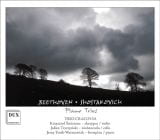 Beethoven, Shostakovich. Piano Trios
Beethoven, Shostakovich. Piano Trios
Ludwig van Beethoven: Piano Trio in D major Op.70 No.1 “Ghost”; Dmitri Shostakovich: Piano Trio No. 2 in E minor Op. 67
Trio Cracovia: Krzysztof Śmietana, violin; Julian Tryczyński, cello; Jerzy Tosik-Warszawiak, piano
DUX 0541
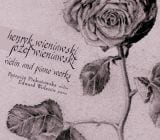 Henryk and Józef Wieniawski. Violin and Piano Works
Henryk and Józef Wieniawski. Violin and Piano Works
Henryk Wieniawski: Polonaise Brillante in A major Op. 21; Legend Op. 17; Józef Wieniawski: Sonata in D minor Op. 24
Patrycja Piekutowska, violin; Edward Wolanin, piano
DUX 0543
